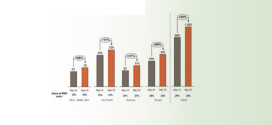More than 75 per cent of private investors believe that the eurozone will survive its crisis, according to a J.P. Morgan Private Bank study revealing the views of High Net Worth investors in Europe, who were asked for their opinions on current market conditions and risk appetite.
The study polled more than 300 High Net Worth investors in 15 cities across Europe and found that opinions were mixed, with more than 75 per cent believing the eurozone will survive the ongoing crisis, possibly with changes to the current structure. Only six per cent said there would be a severe global depression.
High Net Worth investors in Spain, Ireland and the UK were found to have the most optimistic outlook, with 92 per cent, 90 per cent and 85 per cent respectively believing that the eurozone will either manage to avert large defaults or will survive, albeit “looking rather different to the current structure”.
Despite the uncertainty, 45 per cent of wealthy investors think European equities are the most undervalued risk assets. This view was highest in Spain (69 per cent of respondents), Ireland (44 per cent) and the UK (41 per cent). Twenty-four per cent view US real estate as an investment opportunity, followed by Asian equities (11 per cent) and high yield bonds and oil (10 per cent).
The survey also asked High Net Worth investors for their outlook on the best performing sector of 2012. An overwhelming 38 per cent said that technology would be the top performer followed by banking, with 20 per cent of votes, and mining (16 per cent).
Cesar Perez, chief investment strategist for J.P. Morgan Private Bank in Europe, the Middle East and Africa, commented, “Event risk has risen, specifically around European politics. While we expect markets to work through the noise, the next few months are going to be distracted and volatile.
“Until now, policies have been reactive rather than proactive and politicians are not yet willing to integrate more. The arrival of Mario Draghi at the helm of the ECB last year was positive for markets as this increased the likelihood of the ECB acting as the buyer of last resort.”
 Cash And Trade Magazine For Cash and Trade professionals in the Middle East
Cash And Trade Magazine For Cash and Trade professionals in the Middle East




